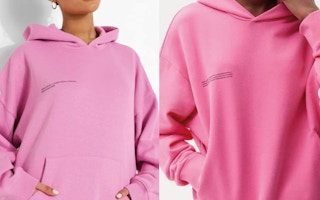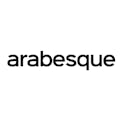What is going on?
Haute couture houses pouring millions into glamorous adverts, Condé Nast publishing its famous thick magazine issue and the world’s fashion weeks around the corner – it’s starting to look a lot like…September! As we say goodbye to Spring/Summer and hello to Autumn/Winter, the fashion industry’s most anticipated time of the year has not begun without notable headlines.
Just last week, Pangaia, the London-based material science and fashion company called out the industry’s infamous copycats – known for imitating styles and trends set by some of the world’s most promising brands. While copying successful fashion ideas is nothing new, there is a concerning yet amusing and ironic twist about Pangaia’s case.
The company’s sole concept is to mainstream sustainable clothing through textile innovation which is showcased by their iconic paragraph of text printed on their items of clothing, describing why and how the respective piece of cloth is sustainable.
Is it therefore safe to assume that other brands copied both the look and the concept? Sadly, the copying brands had eyes for the look only. Rather than describing how the garment was made, Boohoo’s copy instead states “Official Studio, Est. 2004…”. Needless to say, they completely missed the whole sustainability point.
What does it have to do with ESG?
Brand identity and intellectual property form an important part of a company’s identity and value. In a financial context, these attributes are referred to as non-tangible assets which are becoming an ever more important attribute when determining company valuation.
While a mere 17 per cent of the S&P’s market value was attributed to intangible assets in 1975, the dawn of the digital era has brought about a wind of change, with intangibles representing almost 90 per cent of the value of the same basket of companies.
In the context of fashion, ideas that drive a distinctive identity unsurprisingly play a pivotal role in a company’s valuation. However, unlike other industries, theft of ideas often occurs without consequence.
Following the above example, should Pangaia decide to take legal action against its imitators to improve governance and safeguards, preventing such action in the future? Although this seems like the obvious route, Pangaia would likely encounter a fragile legal environment where success is a rarity with the process often lengthy and legal fees hefty. So is it up to us investors to stop supporting copycat companies?
What is the message here?
Pangaia’s case leaves a bitter aftertaste in the short-run, but the bigger picture is more concerning. If a truly innovative, sustainable firm enters the fashion industry and throws itself to the wolves waiting to copy its designs, shouldn’t we see a paradigmatic shift towards broader sustainable choices?
In claiming to make trendy designs available to a wider audience, ultra-fast fashion companies fail to answer at what cost this is executed at. Such companies are prime examples of companies that are not fit for the future; copying brands’ designs, facilitate poor workers’ rights, and perpetuate the throw-away culture and fashion consumerism.
The “wait-and-see” approach will not bring about the necessary change – proactive, customer-driven support for businesses, such as Pangaia, are needed to bring about the much-required change.
Balancing fashion trends and sustainability is not an easy task. How do you develop a capsule closet whilst staying on top of the latest trends? Looking for timeless pieces, thrifting (support Second-hand September), repair and reusing your old clothes are just a few tips we can think of. See you on the catwalk.
Arabesque is a global group of financial technology companies offering sustainable investment, advisory, and data services through advanced ESG and AI capabilities.











